Archived Fire Damage Blog Posts
Protect Your Home: Essential Fire Prevention Tips | SERVPRO of Jackson, SE Ingham County
6/10/2024 (Permalink)
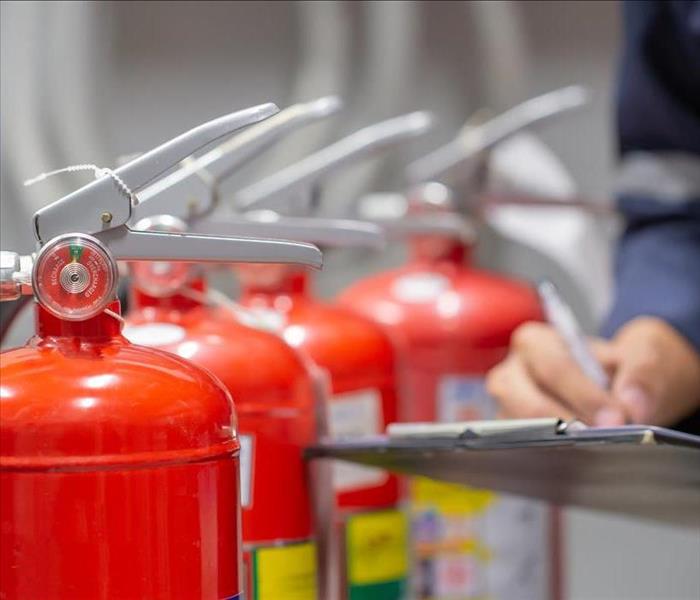 Keep your property safe with these helpful tips from SERVPRO of Jackson, SE Ingham!
Keep your property safe with these helpful tips from SERVPRO of Jackson, SE Ingham!
Home fires can be devastating, causing extensive damage to property and posing serious risks to personal safety. While some fires are unavoidable accidents, many can be prevented with proper precautions and awareness.
At SERVPRO of Jackson, SE Ingham County, we're committed to helping homeowners protect their properties and loved ones from the threat of fire.
Here are some essential fire prevention tips to keep in mind:
Install Smoke Alarms
Smoke alarms are your first line of defense against home fires, providing early warning in the event of smoke or fire. Install smoke alarms on every level of your home, including inside bedrooms and outside sleeping areas. Test your smoke alarms monthly and replace batteries at least once a year. Consider upgrading to interconnected smoke alarms, so when one alarm detects smoke, all alarms in the house will sound.
Create a Fire Escape Plan
Develop a fire escape plan for your family and practice it regularly. Identify two ways out of every room, including windows and doors, and establish a designated meeting place outside. Ensure that everyone in your household knows how to escape in the event of a fire and understands the importance of staying low to the ground to avoid smoke inhalation. Practice your fire drill at least twice a year, including during nighttime hours, when most home fires occur.
Preventive Measures
Take proactive measures to reduce the risk of fire in your home. Keep flammable materials such as curtains, towels, and rugs away from heat sources like stoves, heaters, and candles. Never leave cooking unattended, and keep flammable items away from the stove. Avoid overloading electrical outlets and use surge protectors for additional safety. Regularly inspect and clean chimneys, fireplaces, and dryer vents to prevent the buildup of flammable debris.
Educate Your Family
Educate your family about fire safety and teach children about the dangers of playing with fire. Keep matches, lighters, and other fire-starting materials out of reach of children, and store them in a secure location. Teach children how to safely extinguish a fire using the "Stop, Drop, and Roll" technique and emphasize the importance of reporting any signs of fire or smoke immediately.
Protect Your Home with SERVPRO of Jackson, SE Ingham County
Don't wait until it's too late to protect your home from the risk of fire. Contact SERVPRO of Jackson, SE Ingham County today to learn more about our fire prevention services and how we can help you safeguard your property against fire damage.
From smoke alarm installations to home safety inspections, our team is here to provide expert guidance and support to keep your home and family safe.
Contact SERVPRO of Jackson, SE Ingham County day or night for quick fire damage restoration services.
Why SERVPRO Is the Right Choice for Fire Restoration | SERVPRO® of Jackson/SE Ingham County
6/21/2022 (Permalink)
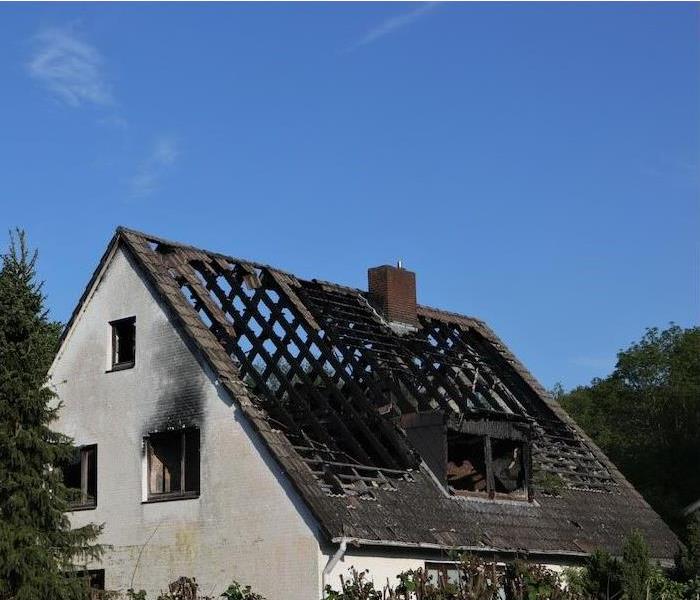 SERVPRO of Jackson/SE Ingham County is always ready to serve you!
SERVPRO of Jackson/SE Ingham County is always ready to serve you!
A house fire is something that no one wants to experience, but unfortunately, they are a rather
common occurrence. Focusing on fire safety efforts and putting together a fire evacuation plan
are such important elements of keeping your family safe, but it is also important to have a plan
in place for who you will call for restoration in the aftermath.
Having a plan in place for after a fire is an important aspect of preparedness, and if you are
looking for a restoration partner for your home, we are the team you can trust. Read on to learn
more about our fire damage restoration philosophy.
We Are Here for You 24/7, 365
Even with the best fire prevention efforts in place, house fires can happen unexpectedly, but
whenever they do, we are here to help. We have an emergency response line available 24 hours a day, 365 days of the year, so whether a fire breaks out in the middle of the night or on a
holiday afternoon, you can count on us to respond to you quickly.
When you call us, we will immediately begin assembling a team and creating an action plan to
handle your damage quickly.
We Understand Fire Damage
Every fire is going to be different, but our expert restoration technicians have a deep understanding of what fire damage restoration takes. From addressing charring to water
damage to smoke and soot in the far reaches of the home, we fully understand everything that
makes up damage from a fire and how to address it.
We Aim to Make Things Easier
Fires are a traumatic event, no matter how mildly or majorly they impact your home—and that is
something we fully understand. That is why our goal is to make things as easy as possible for
you throughout the restoration process.
From providing move-out services if you are in need of temporary housing to working directly
with your insurance company, we can help. You can depend on us to be of assistance during
each and every part of the fire restoration process.
If you need fire damage restoration, SERVPRO is the team you can count on. Get in touch today to learn more about our services.
What Fire Safety Efforts Make the Biggest Difference? | SERVPRO® of Jackson/SE Ingham County
6/7/2022 (Permalink)
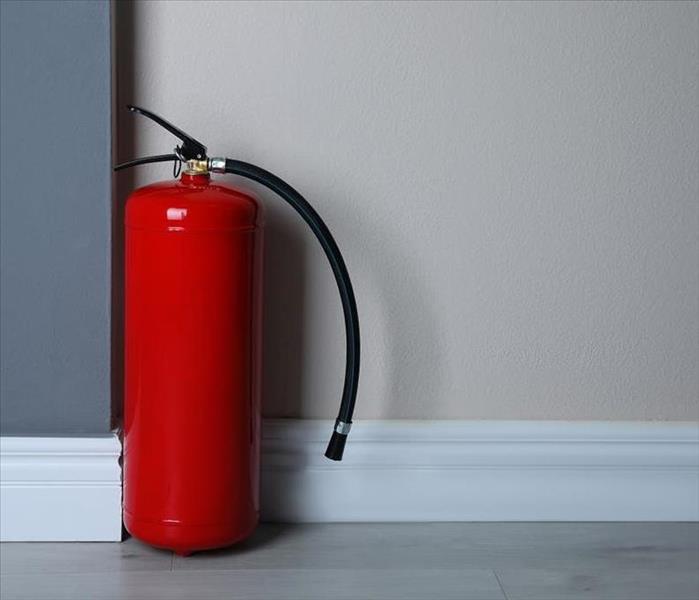 If your home or business has been damaged by a fire, contact SERVPRO of Jackson/SE Ingham County today.
If your home or business has been damaged by a fire, contact SERVPRO of Jackson/SE Ingham County today.
If you are trying to implement more fire safety around your house, you may be overwhelmed by
how many ways a fire can start—and how many ways there are to prevent them! Household
fires are extremely common and can be rather dangerous, but taking proper fire safety efforts
can significantly reduce your risk levels.
While any fire safety efforts are worthwhile, it is important to understand the impact that yours
have on your home and where your attention is best concentrated. Below, we will share our
most important fire safety tips so you can be certain that you are prioritizing the right things
around the house.
Which Fire Safety Efforts Are the Most Important
Installing and maintaining smoke detectors. Many home fire deaths occur due to fires starting while people are sleeping, and thus those inside get a late notice to escape the home.
Installing smoke detectors in every main area of the home and outside of every sleeping area is
the best way to increase your overall fire safety in the home. While these smoke detectors should be checked monthly, this is an easy and inexpensive way to give your household fire safety a boost.
Keeping a fire extinguisher in the kitchen. Cooking is a leading cause of household fires, and because stoves, ovens and toasters all pose a fire risk, it is not surprising as to why. Always practicing cooking safety tips, such as keeping flammable items away from the stove, is a great strategy, but it is also wise to keep a fire extinguisher on hand to quickly address any flare-ups that do occur.
Creating a home fire escape plan. In the event of a house fire, there are often only two
minutes to escape to safety, so knowing exactly how to escape is a must. Planning out a fire
escape plan for your home, ensuring that every area of your house has two exits and practicing
your fire evacuation process regularly are all important to ensuring that everyone in the
household is able to get to safety should a fire start.
If you have fire damage in your household, we are here to help. You can get in touch with us
24/7 to learn more about our process or to report damage to your home.
What to Know When Making a Fire Escape Plan | SERVPRO® of Jackson/SE Ingham County
6/2/2022 (Permalink)
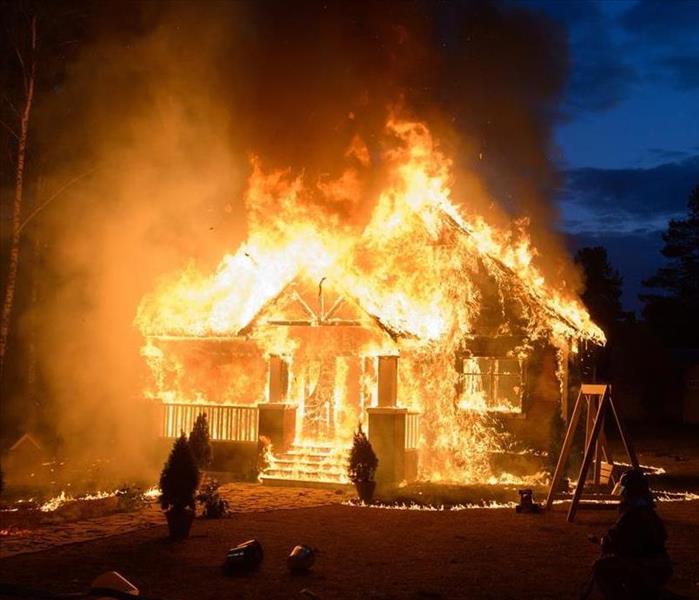 SERVPRO of Jackson/SE Ingham County are your restoration experts! If your home or business has been damaged by a fire, give us a call today.
SERVPRO of Jackson/SE Ingham County are your restoration experts! If your home or business has been damaged by a fire, give us a call today.
House fires are extremely dangerous for a number of reasons. Not only can they cause serious damage to your home, but they can also spread rapidly when they begin—which can put anyone in the home in harm’s way. While we all hope we will never find ourselves in this situation, it is better to be prepared than to be caught off-guard, which is why a home fire escape plan is a must.
Making a plan for your household is important, as it will help everyone act quickly in the event of a fire so they can get to safety. If you are new to drafting your fire escape, we have included some key things to note below.
What to Know About a Household Fire Escape Plan
Time is of the essence. Because of how quickly fires can spread, being able to escape the home quickly in an emergency situation is key. Everyone in your household should be able to execute an escape route in less than two minutes to maximize their ability to get to safety. This is why having a clear plan of action and running through practice drills is so important.
Multiple exits are key. While there are some places a fire may be more likely to break out, such as at the stove or around a space heater, there is no way to know for sure how a fire could start or begin to spread. For this reason, it is important that every area of the home have at least two exits that are accessible—that way, if one is blocked by flames, someone could use the other route to escape. In some cases, you may need to purchase emergency ladders for second-story windows to make this possible.
Teamwork is a must. Depending on the members of your household, you may want to incorporate a buddy system into your fire escape plan. If you have young children, older adults or pets that will need assistance in escaping, make sure it is clear in advance which member of your household will be responsible for helping them get to safety.
If you have damage to your home due to a fire, we are here to help. We’re here 24/7 to start the restoration process—contact us today.
Backyard Grill & Fire Pit Safety | SERVPRO® of Jackson/SE Ingham County
5/24/2022 (Permalink)
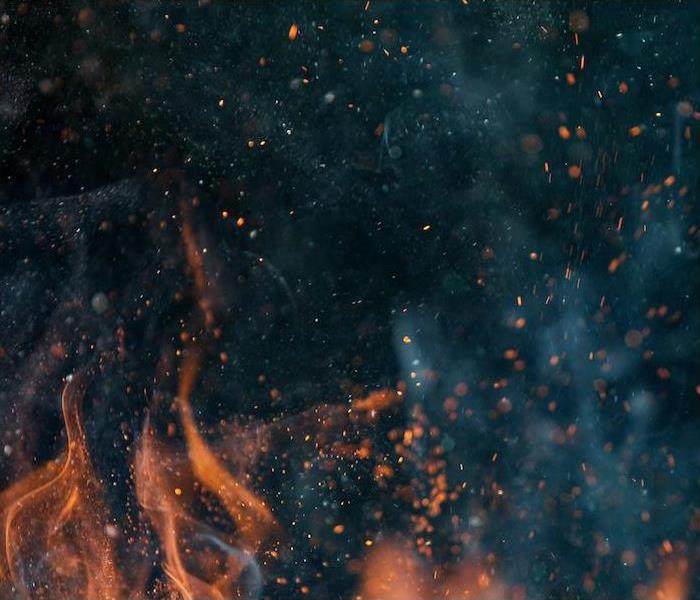 If you have fire damage, call your local SERVPRO of Jackson/SE Ingham County for help!
If you have fire damage, call your local SERVPRO of Jackson/SE Ingham County for help!
The spring and summer months are almost magical. Plants and trees are in perfect bloom, school kids are brimming with excitement, vacation plans are being made…and how is the temperature this perfect?
Springtime also beckons us to that most revered backyard tradition: the barbecue. From graduation parties to gender reveals, church picnics to family reunions, any old excuse will do to break out everyone’s favorite warm-weather cooker.
Unfortunately, an increase in backyard activities also brings with it an increase in fires. In fact, spring sees more daily fires on average than any other time of year. But don’t sweat—save that for August.
With a few common-sense tips, you can be sure your backyard sessions will be safe and fun for everyone.
The grill. Grills are great, but they’re also a perfect opportunity for fires to pop up—the combination of flame, heat, grease and gas gives easy openings for the hungry monster we call fire. Keep the grill away from anything that could ignite (including your house), and never use liquid accelerants to increase flames or heat. Check your grill for leaks or rust holes, and don’t forget to clean it thoroughly—almost 20% of grill fires are due to poor cleaning.
The fire pit. A favorite feature of many newer homes, the fire pit is the social hub of the backyard, but use it safely. Never leave it unattended, and never leave any kids or pets alone by the fire. Don’t add things like pine needles or dry leaves to the fire, either; they create lots of dangerous flying embers. And keep a bucket within arm’s reach, both to slowly cool the fire when the night is through and to handle any jumping flames or ashes.
Chimneys and dryer vents. You don’t have to do these now, but while we’re talking seasonal fire safety, it’s just a good reminder. You won’t need your indoor fireplace until fall, so clean out ash and soot now to avoid potential hazards later. And check your dryer’s vent trap for pent-up lint that could easily combust.
Your local SERVPRO technicians are on hand 24/7 for emergencies. If you encounter fire damage at your home or business, no matter the cause, we will be there faster and have it cleaned up sooner. Call or click today and experience the SERVPRO difference.
What To Do After A Fire
3/16/2022 (Permalink)
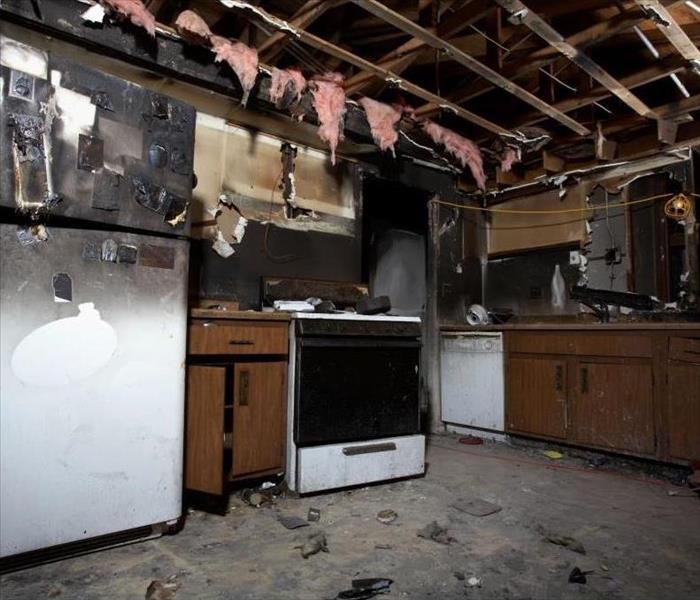 SERVPRO of Jackson/SE Ingham County has the fire damage expertise and equipment to restore your property.
SERVPRO of Jackson/SE Ingham County has the fire damage expertise and equipment to restore your property.
Experiencing a fire, whether at your home or place of business, can be very scary and stressful. Once the fire is out, you may not know what to do or who to call to move forward.
After any fire damage situation, your first priority should be your safety. Is it safe to stay inside your house? If you do stay in the home, be sure to only do activities that are safe for you to perform.
Do:
- Limit movement in the home to prevent soot particles from being embedded into upholstery and carpet.
- Keep hands clean. Soot on hands can further soil upholstery, walls, and woodwork.
- Place dry, colorfast towels or old linens on rugs, upholstery and carpet traffic areas.
- If the electricity is off, empty freezer and refrigerator completely and prop doors open to help prevent odor.
- Wipe soot from chrome on kitchen and bathroom faucets, trim and appliances, then protect these surfaces with a light coating of lubricant.
- If the heat is off during winter, pour RV antifreeze in the sinks, toilet bowls, holding tanks and tubs to avoid freezing pipes and fixtures.
- Wash both sides of leaves on houseplants.
- Change HVAC filter, but leave system off until a trained professional can check the system.
- Tape double layers of cheesecloths over air registers to stop particles of soot from getting in and out of the HVAC system.
Don’t:
- Don’t attempt to wash any walls or painted surfaces without first contacting SERVPRO of Jackson/SE Ingham County.
- Don’t attempt to shampoo carpet or upholstered furniture without first consulting your SERVPRO Professionals.
- Don’t attempt to clean any electrical appliances (TV sets, radios, etc.) that may have been close to fire, heat or water without first consulting an authorized repair service.
- Don’t consumer any food or beverages that may have been stored close to fire, heat or water. They have be contaminated.
- Don’t turn on ceiling fixtures if ceiling is wet. Wiring may be wet or damaged and cause electrical shock, and air movement may create secondary damage.
- Don’t send garments to the dry cleaner. Improper cleaning may set in smoke odor.
If your home or business has been damaged by a fire, call SERVPRO of Jackson/SE Ingham County!
Restoring After A Fire
2/9/2022 (Permalink)
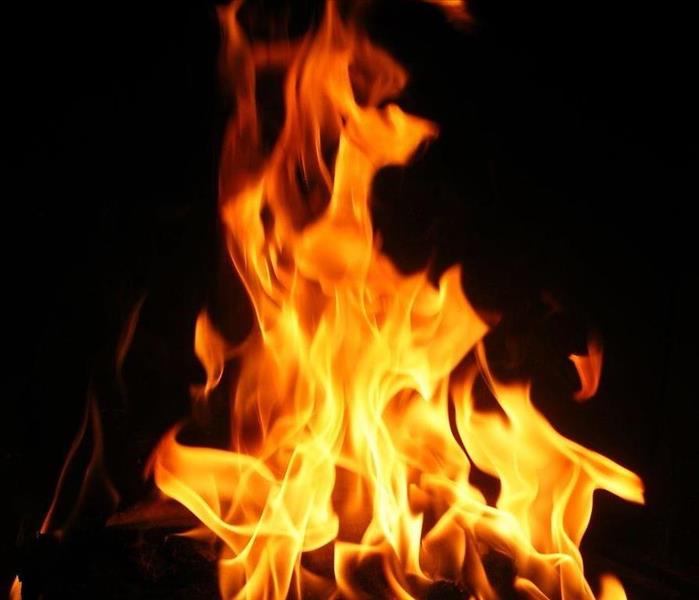 If you're affected by a fire, remember to call the most trusted brand in restoration!
If you're affected by a fire, remember to call the most trusted brand in restoration!
There is no question that fires can cause devastating damage, especially when it involves the home or business you love and own.
When your home or business is affected by a fire, not only can the flames cause catastrophic damage, but the aftermath of putting out a fire can reek just as much havoc. Even after the fire department is long gone, your home or business is still susceptible to water, mold, smoke and soot damage.
Since each fire is a little different, each situation needs to be tailored to best suit you and your property. Here at SERVPRO of Jackson/SE Ingham County, we have the expertise, equipment and enthusiasm to restore your property and mitigate your losses. We'll make it look "Like it never even happened."
SERVPRO of Jackson/SE Ingham County is available 24 hours a day, 7 days a week to help you!
Fire Damage Tips
12/7/2019 (Permalink)
 Cooking mishap caused major fire damage to kitchen.
Cooking mishap caused major fire damage to kitchen.
Experiencing a fire, whether at your home or place of business, can be very scary and stressful. Once the fire is out, you may not know what to do to move forward.
After any fire damage situation, your first priority should be your safety. Is it safe to stay inside your house? If you do stay in the home, be sure to only do activities that are safe for you to perform.
Do:
- Limit movement in the home to prevent soot particles from being embedded into upholstery and carpet.
- Keep hands clean. Soot on hands can further soil upholstery, walls, and woodwork.
- Place dry, colorfast towels or old linens on rugs, upholstery and carpet traffic areas.
- If the electricity is off, empty freezer and refrigerator completely and prop doors open to help prevent odor.
- Wipe soot from chrome on kitchen and bathroom faucets, trim and appliances, then protect these surfaces with a light coating of lubricant.
- If the heat is off during winter, pour RV antifreeze in the sinks, toilet bowls, holding tanks and tubs to avoid freezing pipes and fixtures.
- Wash both sides of leaves on houseplants.
- Change HVAC filter, but leave system off until a trained professional can check the system.
- Tape double layers of cheesecloths over air registers to stop particles of soot from getting in and out of the HVAC system.
Don’t:
- Don’t attempt to wash any walls or painted surfaces without first contacting your SERVPRO of Northeast Columbus Professionals.
- Don’t attempt to shampoo carpet or upholstered furniture without first consulting your SERVPRO of Northeast Columbus Professionals.
- Don’t attempt to clean any electrical appliances (TV sets, radios, etc.) that may have been close to fire, heat or water without first consulting an authorized repair service.
- Don’t consumer any food or beverages that may have been stored close to fire, heat or water. They have be contaminated.
- Don’t turn on ceiling fixtures if ceiling is wet. Wiring may be wet or damaged and cause electrical shock, and air movement may create secondary damage.
- Don’t send garments to the dry cleaner. Improper cleaning may set in smoke odor.
Fire Prevention Week
10/4/2016 (Permalink)
Since 1922, Fire Prevention Week has been observed on the Sunday through Saturday period in which October 9th falls.
Fire Prevention Week was established to commemorate the Great Chicago Fire, the tragic 1871 conflagration that killed more than 250 people, left 100,000 homeless, destroyed more than 17,400 structures and burned more than 2,000 acres. The fire began on October 8th, but continued into and did most of its damage on October 9th, 1871.
According to popular legend, the fire broke out after a cow-belonging to Mrs. Catherine O'Leary- kicked over a lamp, setting first the barn, then the whole city on fire. Chances are you've heard some version of this story yourself; people have been blaming the Great Chicago Fire on the cow and Mrs. O'Leary for more than 130 years. But, recent research by Chicago Historian Robert Cromie has helped debunk this version of events.
Like any good story, the 'case of the cow' has some truth to it. The great fire almost certainly started near the barn where Mrs. O'Leary kept her five milking cows, but there is no proof that O'Leary was in the barn when the fire broke out, or that a jumpy cow sparked the blaze. Mrs. O'Leary herself swore that she'd been in bed early that night, and that the cows were also tucked in for the evening.
So if a cow wasn't to blame for the huge fire, what was? Over the years, journalists and historians have offered plenty of theories. Some blamed the blaze on a couple of neighborhood boys who were near the barn sneaking cigarettes. Others believe that a neighbor of the O'Leary's may have started the fire. Some people have speculated that a fiery meteorite may have fallen to earth on October 8th, starting the several fires that day - in Michigan, Wisconsin, as well as in Chicago.
While The Great Chicago Fire was the best known blaze to start during this fiery two-day stretch, it wasn't the biggest. That distinction goes to the Peshtigo Fire, the most devastating forest fire in American history. The fire, which also occurred on October 8th, 1871, roared through Northeast Wisconsin burning down 16 towns, killing 1,152 people and scorching 1.2 million acres before it ended.
Historical accounts of the fire say that the blaze began when several railroad workers clearing land for tracks unintentionally started a brush fire. Before long, that fast moving flames were whipping through the area 'like a tornado', some survivors said. It was the small town of Peshtigo, Wisconsin that suffered the worst damage. Within an hour, the entire town had been destroyed.
Those who survived the Chicago and Peshtigo fires never forgot what they had been through; both blazes produced countless tales of bravery and heroism. The fires also changed the way that firefighters and public officials thought about fire safety. On the 40th Anniversary of The Great Chicago Fire, the Fire Marshall's Association of North America decided that the anniversary of The Great Chicago Fire should henceforth be observed not with festivities, but in a way that would keep the public informed about the importance of fire prevention.
Fire Prevention Week is the longest running public health safety observance on record dating back to 1920.
Fire
6/7/2016 (Permalink)
The heart of the home is the kitchen, so it is no surprise that cooking fires are one of the most common types of home fires. Kitchen fires typically happen when the stove is left unattented, this can occur any time of the year. If a fire starts in a pot or pan on the stove, these are things to remember:
-EVALUATE YOUR SAFETY. If the fire is large and spreading, quickly assemble your family outside and call for emergency services. Your families safety is more important than the safety of your home.
-NEVER USE WATER. Water should never be used to try to extinguish a grease fire. This can result in an explosive reaction that can cause the fire to quickly spread throughout the home.
-TURN OFF THE STOVE. Heat is needed to keep the grease alive.
-BAKING SODA. Throw a good amount of baking soda to cut off the oxygen supply. Do not use flour or other baking materials as this will only add to the fire.
-KEEP A LID NEARBY. Snuff the fire with a lid to the pot or pan. Turning off the stove at the same will take away the heat and oxygen needed to sustain the fire.
Most fires can be prevented by never leaving food cooking unattended.


 24/7 Emergency Service
24/7 Emergency Service







